| Listing 1 - 10 of 132 | << page >> |
Sort by
|
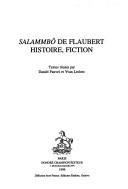
ISSN: 11692944 ISBN: 274530058X 9782745300584 Year: 1999 Volume: 22 Publisher: Paris: Champion,
Abstract | Keywords | Export | Availability | Bookmark
 Loading...
Loading...Choose an application
- Reference Manager
- EndNote
- RefWorks (Direct export to RefWorks)
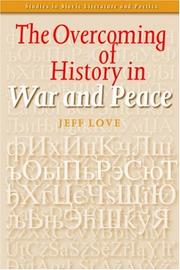
ISBN: 9042016329 9789042016323 9789401201254 9401201250 1423791126 9781423791126 Year: 2004 Volume: 42 Publisher: Amsterdam ; New York Rodopi
Abstract | Keywords | Export | Availability | Bookmark
 Loading...
Loading...Choose an application
- Reference Manager
- EndNote
- RefWorks (Direct export to RefWorks)
The Overcoming of History in "War and Peace" marks a radical departure from the critical tradition dominated by Sir Isaiah Berlin's view that the novel is deeply divided against itself, a majestically flawed contest of brilliant art and clumsy thought. To the contrary, Jeff Love argues that the apparently divided nature of the text, its multi-leveled negotiation between different kinds of representation, expresses the rich variety of the novel's very deliberate striving to capture the fluidity of change and becoming in the fixed forms of language. The inevitable failure of this striving, revealing the irreducible conflict between infinite desire and finite capacity, is at once the source of new beginnings and the repetition of old ones, a wellspring of continually renewed promises to achieve a synoptic vision of the whole that the novel cannot fulfill. This repetitive struggle between essentially comic and tragic conceptions of human action, far from being a pervasive flaw in the texture of the novel, in fact constitutes its dynamic center and principal trope as well as the productive origin of the unusual features that distinguish it as an uncommonly bold narrative experiment.
Geschiedenis in de literatuur --- Histoire dans la littérature --- History in literature --- Tolstoy, Leo --- History in literature.
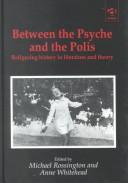
ISBN: 0754602281 Year: 2001 Publisher: Aldershot ; Burlington ; Singapore Ashgate
Abstract | Keywords | Export | Availability | Bookmark
 Loading...
Loading...Choose an application
- Reference Manager
- EndNote
- RefWorks (Direct export to RefWorks)
Geschiedenis in de literatuur --- Histoire dans la littérature --- History in literature --- History --- Philosophy
Dissertation
Abstract | Keywords | Export | Availability | Bookmark
 Loading...
Loading...Choose an application
- Reference Manager
- EndNote
- RefWorks (Direct export to RefWorks)
van dis (adriaan), 1946 --- -polak (chaja), 1941 --- -histoire dans la litterature
Book
Year: 2000 Publisher: Nantes : Pleins feux,
Abstract | Keywords | Export | Availability | Bookmark
 Loading...
Loading...Choose an application
- Reference Manager
- EndNote
- RefWorks (Direct export to RefWorks)
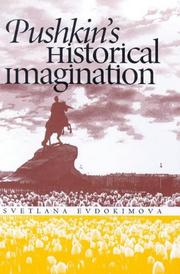
ISBN: 0300070233 Year: 1999 Volume: *2 Publisher: New Haven ; London Yale University Press
Abstract | Keywords | Export | Availability | Bookmark
 Loading...
Loading...Choose an application
- Reference Manager
- EndNote
- RefWorks (Direct export to RefWorks)
Geschiedenis in de literatuur --- Histoire dans la littérature --- History in literature --- History in literature. --- Pushkin, Aleksandr Sergeevich --- Knowledge --- History
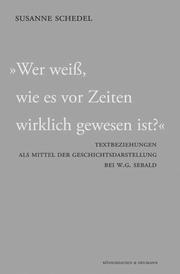
ISBN: 3826027280 Year: 2004 Volume: 3 Publisher: Würzburg : Königshausen & Neumann,
Abstract | Keywords | Export | Availability | Bookmark
 Loading...
Loading...Choose an application
- Reference Manager
- EndNote
- RefWorks (Direct export to RefWorks)
History in literature. --- Histoire dans la littérature --- Sebald, Winfried Georg, --- Histoire dans la littérature --- Sebald, W. G.
Book
ISBN: 9782252037102 2252037105 Year: 2013 Publisher: Paris: Klincksieck,
Abstract | Keywords | Export | Availability | Bookmark
 Loading...
Loading...Choose an application
- Reference Manager
- EndNote
- RefWorks (Direct export to RefWorks)
Et si Ponce Pilate avait gracié Jesus ? Si Hitler était mort en 1930 dans un accident de voiture ? Si Napoléon avait gagné à Waterloo ? La suite de l'histoire du monde en eut été changée. Contrairement à d'autres formes de littérature de l'imaginaire ou l'inventivité ne se donne pas de limites, dans l'uchronie, il s'agit de réécrire une histoire probable à partir d'un point où les faits auraient pu diverger. L'uchronie (u préfixe négatif + chronos, temps) est, disait son fondateur Charles Renouvier, une "utopie appliquée à l'histoire", c'est-a-dire l'histoire "refaite logiquement telle qu'elle aurait pu être". Le présent ouvrage, écrit par le spécialiste français de l'uchronie, propose définitions, descriptions et comparaisons qui permettent de saisir toutes les nuances de ce genre fascinant où la fantaisie rejoint souvent la méditation philosophique et la réflexion historique.
Fiction --- Thematology --- Imaginary histories. --- History --- History in literature. --- Histoire-fiction --- Histoire --- Histoire dans la littérature --- Miscellanea. --- Miscellanées --- Histoire dans la littérature --- Miscellanées
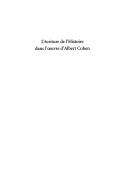
ISBN: 2841332365 Year: 2005 Volume: *2 Publisher: Caen Presses universitaires de Caen
Abstract | Keywords | Export | Availability | Bookmark
 Loading...
Loading...Choose an application
- Reference Manager
- EndNote
- RefWorks (Direct export to RefWorks)
Cohen, Albert --- History in literature --- Literature and history --- Histoire dans la littérature --- Littérature et histoire --- Cohen, Albert, --- Histoire dans la littérature --- Littérature et histoire
Book
ISBN: 0820304190 Year: 1977 Publisher: Athens University of Georgia Press
Abstract | Keywords | Export | Availability | Bookmark
 Loading...
Loading...Choose an application
- Reference Manager
- EndNote
- RefWorks (Direct export to RefWorks)
American literature --- USA: South --- Geschiedenis in de literatuur --- Histoire dans la littérature --- History in literature --- American fiction --- History and criticism --- Histoire dans la littérature --- Southern States
| Listing 1 - 10 of 132 | << page >> |
Sort by
|

 Search
Search Feedback
Feedback About UniCat
About UniCat  Help
Help News
News